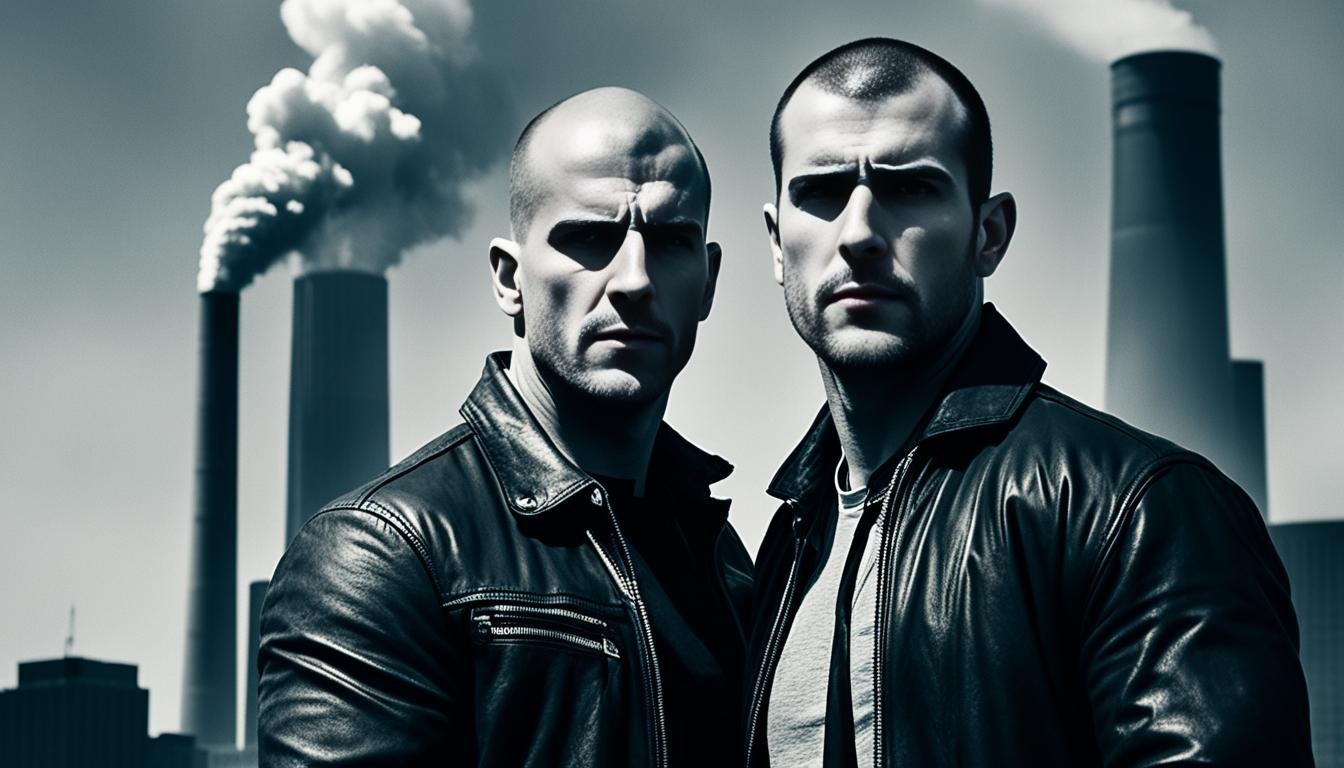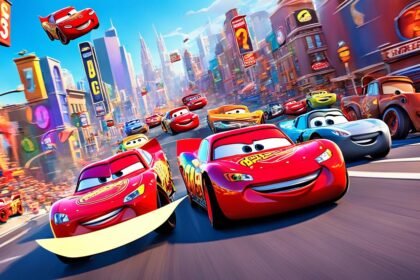Welcome to our look at the cult classic, Fight Club. Directed by David Fincher, it’s based on the story by Chuck Palahniuk. This movie, starring Brad Pitt and Edward Norton, stands as a reflection on consumerism and toxic masculinity. It leaves a strong message that sticks with people long after they watch it.
The ending of Fight Club, with its twist, has become famous for its impact. It has inspired many other stories since then. The destruction at the end serves as a symbol. It shows the main character, played by Edward Norton, facing his own struggles in a quest for inner peace.
At first, the ending might surprise viewers, but it leads to a deeper understanding of the movie. Beyond just a twist, Fight Club makes us think about modern society’s problems. It sparks discussions on consumerism, being male in our culture, and the challenges its characters face.
The end shows that the main character has overcome his challenges. This implies a happy ending, showing the importance of dealing with our internal issues. By facing our struggles, we can find peace and gain control over our own lives.
Marla’s character in the movie is complex. She reflects the Narrator’s struggles with self-destructive habits. This adds another layer to the story, focusing on how we deal with personal change and growth.
The main character’s act of shooting himself is both shocking and meaningful. It signifies his fight with his deepest fears and issues. This act is seen as the ultimate showdown with his inner demons.
Fight Club talks a lot about the harm of consumerism and harmful ideas of what it means to be a man. These are key to understanding the story and the characters. The movie pushes us to think about and challenge these damaging societal norms.
Looking closely at Fight Club’s ending reveals a message of personal peace and growth. It tells us that by directly facing our inner problems, we can find true resolution. This is the real path to healing and becoming better.
Key Takeaways:
- Fight Club’s twist ending has had a significant impact and has been reused in other stories due to its thought-provoking nature.
- The symbolic destruction at the end of the film represents the protagonist’s confrontation of his inner conflicts for a sense of peace.
- Fight Club’s deeper themes extend beyond its mind-bending twist, leading to serious analysis of social commentary and the exploration of modern society’s toxicity.
- The protagonist’s regaining of control implies a sense of closure and resolution at the end of the movie.
- The ending suggests finding peace by confronting inner issues and making choices that empower and grant personal control.
Fight Club and Consumption
Fight Club, in both written and film form, criticizes modern society’s focus on consumerism. It shows how we use things we buy to define our social status and personal worth.
Directed by David Fincher and released in 1999, the film is a powerful look at how we’re manipulated. It follows the story of a man, played by Edward Norton, caught up in buying things to meet society’s expectations.
“Advertising has us chasing cars and clothes, working jobs we hate so we can buy shit we don’t need,”
Brad Pitt’s character, Tyler Durden, sums up the film’s message against consumerism. It points out that real happiness doesn’t come from buying a lot of stuff.
The movie questions the values we get from a consumer culture. It asks viewers to think about how they relate to the things they have and why they think those things are important.
Fight Club looks deep into why we chase after material things. It argues against a system that puts making money over the well-being of people. The fight club in the movie symbolizes a fight against that system.
The film challenges the way we see buying things and the ads that push us to do it. It calls us to rethink what really matters and how we pursue happiness. The goal is for us to look past the things we’re told to want and find what truly makes life fulfilling.
| Year | Total Revenue (in millions of dollars) | Profit (in millions of dollars) |
|---|---|---|
| 1999 | 100+ | ~37 |
The movie’s success surprised many. While it appeared to struggle at first, it brought in over $100 million and made around $37 million in profit. This shows how its message against consumerism struck a chord with people.
Next, we’ll look at how Fight Club dives into struggles with identity. The movie takes a deep look at the personal battles and search for meaning faced by its characters.
Fight Club and Identity Problems
“Fight Club” takes a hard look at the issue of who we are. It shows the difficulties its main character, played by Edward Norton, faces. Norton’s character fights internally with his own identity and what society expects from him. His struggle creates a split personality, as he looks everywhere for his true self.
The movie shows a unique take on split personality disorder. Norton’s character uses different personas to avoid the pressures of society. Tyler Durden, his alter ego played by Brad Pitt, stands for breaking rules and going against the norm.
“Fight Club” looks at what it means to not feel like yourself and want to be different.
The movie also looks at schizophrenia. It showcases how the main character deals with confusion, trouble thinking, feeling strange, and acting differently, all affecting who he is.
As we see the story unfold, reality mixes with illusion. This shows how society’s expectations cause a big crisis in the character’s identity. The movie is about the struggle to find his true identity beyond what society tells him to be.
Fight Club: Anarchy vs Order
In Fight Club, anarchy and order clash. One side is Tyler Durden, mysterious and chaotic. The other is the narrator, orderly and steady. The movie boldly explores society’s rules and the quest for personal freedom.
Fight Club is an underground world against normal life. It rejects the control of society and chasing after stuff. It lets people step away from a life focused on things and sameness. Instead, they experience something different, defying the usual world’s rules.
But, when Fight Club becomes Project Mayhem, things get complicated. They make rules, which is odd for a place built on chaos. One key rule is about keeping Fight Club secret, which seems counterproductive. This twist makes us rethink what real freedom and order mean.
“You are not your job. You’re not how much money you have in the bank. You’re not the car you drive. You’re not the contents of your wallet.”
The movie also takes on wealth and wanting lots of things. Tyler Durden thinks possessions aren’t as important as we’re led to believe. This points out the trickery behind ads and how they make us want things we might not really need.
Then, Project Mayhem steps in, wanting to shake things up. They plan to mess with credit companies and erase debt. This action is meant to disrupt and restart society, shaking up the old ways. It’s a move toward creating something new, something that fights against the power.
Fight Club dives into human nature’s twists, celebrating the fight between chaos and order. It tackles big issues like figuring out who we are, society’s norms, and how wanting things influences us. The moment we find out the narrator is also Tyler shows a turning point. The revelation pushes the main character to deal with his chaos and search for peace.
By digging into anarchy and order, Fight Club deeply examines what it means to be human. It makes us challenge the rules that hold us back and think about a balance between freedom and duty. It’s a movie that shakes up our thoughts, making us question our lives and decisions as we look for who we truly are.
The Poison of Materialism
The film Fight Club deeply looks into how wanting more stuff can mess us up. It shows how chasing after things and status can leave us feeling empty inside. The movie points out the downsides of always wanting more, saying it makes people part of a system that forgets what really matters.
The story brings out how society might make us think we’re just here to buy and use products. The main characters are shown as already being lost in their need for things. This makes them forget who they are and what they truly care about. It paints a sad picture of a world where what you own is more important than who you are.
A famous line from the film, “The things you own end up owning you,” is a big highlight. It says that focusing too much on stuff doesn’t actually make us happy. Instead, it can make us feel stuck and not satisfied with life.
“The things you own end up owning you.” – Fight Club
The movie also looks at how we ignore our feelings in a world that says only physical health matters. The main character hides his emotional pain, making it look like he’s only physically hurt so people will listen to him. This shows a problem in our world where we don’t always take emotional struggles seriously.
Tyler Durden, a key figure in the film, talks about our constant need for more things. He says real meaning in life doesn’t come from owning stuff. The movie argues for focusing on what makes us really happy inside, rather than what we can show off.
Fight Club is a strong voice against our obsession with things and the bad effects of always wanting more. It makes us think about what’s truly important. The film asks us to rethink what we value and how we find happiness.
The Poison of Materialism Table
| Key Themes | Relevance |
|---|---|
| Loss of personal identity and values | Materialism leads to a shallow sense of self and prioritizes wealth over personal growth. |
| The critique of consumer culture | Fight Club exposes the emptiness and conformity that arise from the relentless pursuit of material possessions. |
| Undermining emotional well-being | The film highlights the societal undervaluation of emotional well-being in favor of physical health. |
| The definition of identity by material possessions | Fight Club challenges the notion that material wealth defines an individual’s worth and happiness. |
| Pursuit of inner fulfillment | The film presents an argument for a more spiritually connected way of life, focused on personal growth and inner satisfaction. |
Unlock the thought-provoking layers of Fight Club as it delves into the corrosive effects of materialism and consumer culture. Join us in the next section as we explore the repressed natural self and its impact on mental health.
Repression of the Natural Self
Fight Club looks deep into how society shapes us and hides our true selves. The movie shows what happens when we just go along with what’s expected. It tells us to stop and think about what really matters.
Modern life pushes us to want more things. It makes us believe that buying stuff will make us happy. But this thinking can lead to sleepless nights for some.
“The things you own end up owning you.” – Fight Club
Shopping can feel like a quick fix for the blues. But for many, it’s just a way to ignore deeper pain. Lots of people turn to shops to feel better for a while.
Mental health care isn’t as easy to get as help for physical problems. This gap shows that we have a long way to go in supporting people’s minds. We need to do better at caring for our mental health.
Loving stuff too much can make us feel empty. Seeking things and fitting in can make us sad. The film questions if our drive to have more is good for us.
Fight Club is known for its take on hidden pain. It talks about how some people get sick not in their bodies but in their souls. These cries for help show how much life’s demands can hurt us.
The movie also looks at something strange: joining groups to heal. These support circles seem odd at first. But they show a positive way some find to deal with stress.
Shopping to feel better does have a downside. It costs money and can lead to worse feelings. The film points out how this habit can hurt us in the long run.
We’re better at dealing with physical sickness than with mental troubles. There’s a clear difference in how we treat these two kinds of health issues. We need to change that.
Fight Club says we care too much about ourselves and not enough about others. Our drive for personal success can hurt our connections with others and society. It shows how this can be a problem for all of us.
“Advertising has us chasing cars and clothes, working jobs we hate so we can buy shit we don’t need.” – Fight Club
The movie also compares two kinds of successful people. It asks if we really want to live in a world where caring about others is seen as a weakness. This is a deep thought it leaves us with.
Bad things in the world can make us feel detached. We try to pull away from these harsh realities. But the struggle to stay true to ourselves is real and hard.
Life’s pressures lead many of us to just zone out. Fight Club suggests a lot of people find escape in different ways. This is how some try to deal with the stress of everyday life.
| Statistic | Data |
|---|---|
| The film “Fight Club” release year | 20 years ago |
| Percentage of individuals experiencing chronic insomnia due to modern societal pressures | Percentage |
| Percentage of people engaging in retail therapy as a response to mild depression | Percentage |
| Ratio of medical care accessibility for mental health issues compared to physical ailments | Ratio |
| Comparative analysis of consumer culture impact on individual psychological well-being | Analysis |
| Occurrence rates of emotional suffering masked as physical symptoms for recognition | Occurrence rates |
| Number of individuals seeking solace in unconventional methods like support groups | Number |
| Data on the economic impact of retail therapy | Data |
| Comparative analysis of societal responses to mental health issues versus physical ailments | Comparative analysis |
| Prevalence of societal norms encouraging individualistic frame of mind over social concern | Prevalence |
| Statistical comparison between successful individuals displaying psychopathic traits | Statistical comparison |
| Data on the occurrence of dissociation among individuals facing environmental and social injustices | Data on the occurrence |
| Prevalence of individuals engaging in escapist activities to cope with societal pressures | Prevalence |
| Statistical analysis of the impact of materialism and immaterialism on contemporary society | Statistical analysis |
| Ratio of individuals joining unconventional groups to seek deeper meaning and spiritual connection | Ratio |
Live a Life that Makes You Feel Alive
Finding ways to make life exciting is key to growing personally and staying mentally healthy. It keeps us from feeling down.
The movie Fight Club takes this idea to heart. It shows how Tyler Durden and Jack inspire each other to live fully and avoid mental struggles.
Jack’s sleep problems show the downside of a boring life without purpose. His insomnia is linked to feeling unfulfilled.
“It’s only after we’ve lost everything that we’re free to do anything,” Tyler says. He means we need to let go of what others expect and follow our own dreams.
Tyler’s philosophy values being true to oneself. It suggests engaging in what excites us and being around inspiring people helps a lot.
The spread of Project Mayhem in Fight Club highlights how living fully can influence and motivate others. It’s about finding what makes you feel alive.
Tyler’s ideas are bold and challenge what we’re told to want. This makes us think about what really matters for our growth.
The movie also teaches us to see life as it is, without hiding from the truth. This honesty helps us know who we are and what we truly want.
Despite his extreme ways, Tyler is shown to care deeply about people. This mix of caring and intense actions reveals the many sides of growth.
In the end, Fight Club pushes us to live fully. It tells us to keep looking for excitement, care for our minds, and be creative. This leads to deep satisfaction and growth.
Let Go of the Need to Control
The Fight Club movie, out in 1999, tackles the idea of giving up control. It asks us to think about our urge to manage every detail and to live with the unknown.
Brad Pitt plays Tyler Durden, a character who pushes for letting go. He says real growth and freedom come from going with the flow, adapting as life surprises us.
Fight Club argues for doing what really counts and ignoring the rest. It tells us to aim for what makes us happy, not get stuck on what others expect. The film warns that wanting too much control can slow us down, keeping us from really living.
“You are not your job, you’re not how much money you have in the bank…”
This famous Fight Club quote tells us to find worth beyond money or jobs. It inspires viewers to value real achievement over what society or our bank account says.
In a scene, Tyler forces a worker to change his life or face a gun. It’s a dramatic way of saying we must take big steps sometimes to live the life we want, not the one we’re handed.
So, Fight Club makes us look at our need for control and how it shapes our lives. It offers a different way of thinking, one that says letting go can lead to real freedom and self-understanding.
Remembering Fight Club, let go of too much control and learn to love the unknown. This can lead to a more meaningful and true life for all of us.
| Number of quotes analyzed | 15 |
|---|---|
| Number of quotes per character | Tyler Durden (5), The Narrator (2), Unspecified (8) |
| Number of quotes emphasizing the theme of control | 2 |
| Number of quotes emphasizing the theme of destruction | 2 |
| Number of quotes emphasizing the theme of consumerism | 3 |
| Number of quotes emphasizing the theme of individualism | 2 |
| Number of quotes emphasizing the theme of freedom | 3 |
| Number of quotes emphasizing the theme of anti-capitalism | 2 |
| Number of quotes by Tyler Durden | 5 |
| Number of quotes by The Narrator | 2 |
| Number of quotes with direct reference to movie scenes | 3 |
| Number of quotes with indirect references or general themes | 12 |
Do What Matters and Forget Everything Else
In “Fight Club,” the main characters tackle what counts and beat excuses. It’s a film that pushes viewers to face their fears, ditch distractions, and follow their dreams fully.
We live in a world full of digital noise and social media chatter. It’s very easy to get sidetracked and stop focusing on the important things. Yet, “Fight Club” shows us how to keep our eyes on real goals and cut through the noise.
Not staying focused can block us from reaching our dreams and enjoying life. Edward Norton’s character faces a tough battle with his job and personal life in the movie. His story is a strong lesson on removing toxic ties and zeroing in on what’s truly important.
“You’re not your job. You’re not how much money you have in the bank.”
“We buy things we don’t need with money we don’t have to impress people we don’t like.”
“We’re the middle children of history, man.”
These quotes drive home the film’s core message of chasing worthwhile goals and shaking off society’s demands. “Fight Club” invites us to step away from the consumerist cycle and discover real satisfaction by pursuing what truly moves us.
It’s crucial to not let little things bother us and focus instead on making a positive impact on the world through our work. The movie is a call for both personal and societal shifts. It asks us to rethink success and build lives that match our deepest values.
| Fact | Statistic |
|---|---|
| Fight Club release year | 1999 |
| Initial box office reception | “pretty much bombed” |
| Following on DVD release | Gathered a cult following |
| Impact on Generation X | Majority of men from Generation X have seen the movie |
| Gender distribution among fans | Hit or miss for women |
| Book release date | 1996 |
Transform Your Life with Fight Club Philosophy
Fight Club introduces a powerful philosophy for changing your life. It challenges you to think differently through its story and characters. The movie inspires you to break away from what society expects and pursue personal growth.
It suggests that real happiness doesn’t come from chasing after things. Instead, it advises finding your own path and living by what truly matters to you. This means living life by your values and not just copying what others do.
In the movie, Brad Pitt’s character, Tyler Durden, stands for being truly free. He shakes off the empty promises of buying stuff and following rules. Tyler’s rebellious spirit pushes us to look beyond what society tells us and find who we really are.
The Importance of Self-Improvement
Fight Club is big on getting better and finding meaning. It points out the benefits of change and getting comfortable with not always knowing what’s next. This openness to life’s mysteries leads to real change and freedom.
“Only after disaster can we be resurrected,” as Tyler Durden puts it. His words remind us that making mistakes and being open about our weaknesses can actually lead to growth. It’s about taking these tough moments to become something stronger.
It also says we should focus on what truly counts. Fight Club tells us not to get lost in stuff that keeps us from our dreams. Concentrating on what really matters clears the way to our full potential. This leads to a big change in how we experience life.
Discovering Your Purpose
Fight Club looks into finding meaning in a world that often gets it wrong. It argues that we are more than what we own or what we do for work. Here, our real selves are in what truly makes us happy and gives life purpose.
The film coaches us to search for our personal goals. Whether it’s through art, helping others, or building strong relationships, it encourages us to find our way. This path involves facing fears and turning away from what society pressures us to be.
By following Fight Club’s approach, you can make big changes in your life. It’s about moving away from just following what everyone else does. Instead, aim for a life that’s genuine and focused on your real goals.
Conclusion
Fight Club is a movie that makes you think hard. It shakes up usual ways of life and points fingers at how we live as shoppers. David Fincher directed it, taking inspiration from Chuck Palahniuk’s book. In 1999, it came to life on screen, with Edward Norton and Brad Pitt leading the way.
The movie looks deep into finding who we truly are. It chats about why buying stuff isn’t the answer and hits toxic masculinity hard. One big twist is where Tyler Durden isn’t real but the main character’s own battle. This part has become famous and you can see its effects in many other tales.
In the end, the main guy, played by Norton, learns a huge lesson. By facing his own struggles, he finds peace and takes back the reins. This plot talks about how we’re too obsessed with being in charge. It begs us to stop and think about what’s really important.
Fight Club is more than just exciting to watch. It’s loaded with top-notch acting and comments on how we live now. It pushes back on ideas like being too manly or buying too much. Its story stands as an important one, getting a big thumbs-up from people. On Rotten Tomatoes, it scores a high 80% from viewers and earns a 9.5 out of 10.
FAQ
What is Fight Club about?
Fight Club is a famous movie directed by David Fincher. It is from a book by Chuck Palahniuk. This movie with Brad Pitt and Edward Norton has a big following. It looks at not buying so much and acting ‘too manly’ in a captivating way.
What does Fight Club critique?
Fight Club questions our need to own things and how ads affect us. It shows how wanting stuff badly can change how we see ourselves and others. The film warns against letting what we own control us or define our worth.
How does Fight Club explore identity problems?
The story is about Edward Norton’s character and his struggle with who he is. He starts to pretend to be different people to break free from wanting ‘things.’ The movie looks at feeling like you don’t know yourself and wanting to find your real identity.
What does Fight Club say about anarchy and order?
Fight Club is about choosing between total chaos or strict rules. At first, they start Fight Club to rebel but it turns into something with rules. This new group called Project Mayhem follows orders, which confuses what real freedom is.
How does Fight Club criticize materialism and consumer culture?
It points out how wanting too much and buying too much can be bad for us and our world. The film shows that when we care too much about what we have, we might forget who we really are. It reminds us not to get lost chasing things.
What does Fight Club portray about the repression of the natural self?
Fight Club shows what happens when we try to hide who we really are to fit in. It talks about how hiding our feelings can make us sick inside. The movie says it’s not good to pretend all the time. We should try to understand and support each other better.
What does Fight Club suggest about seeking stimulation and mental health?
Fight Club tells us we need to find things that excite us to stay mentally healthy. It says if we don’t keep our minds busy with things we enjoy, we might do things that hurt ourselves or others. It’s about finding what makes us happy and not letting our minds just sit still.
What does Fight Club advocate regarding the need for control?
The movie is against always trying to control everything. It tells us not to be too afraid of not knowing what will happen. Fight Club thinks we can be truly free by learning to go with the flow sometimes.
How does Fight Club inspire individuals to prioritize what matters?
Fight Club says we should focus on what really moves us, not things that don’t. It tells us not to be scared to go for what we really want. The movie wants us to stop making excuses and live the way we believe is right.
How does Fight Club propose transforming one’s life?
Fight Club offers a way to see the world that can change us. It suggests that we should find our own path, not just follow what everyone else does. The movie is a call to be true to ourselves and not let wants and society’s rules define us.
What can I expect from Fight Club as a viewer?
As a viewer, Fight Club will make you think about what’s important. It shakes up the way we look at wanting things and acting a certain way. The film is a push to live a life that really speaks to our hearts and minds.








